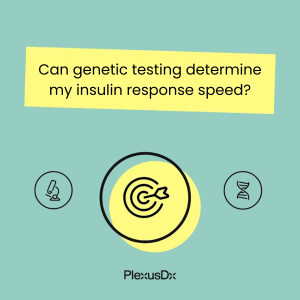
Unlock the power of genetic testing with Ask PlexusDx, the podcast that turns complex DNA insights into actionable wellness advice. Each short, science-backed episode breaks down genetic methylation, nutrient metabolism, sleep, fitness, longevity, and more—helping you make smarter lifestyle, nutrition, and supplement choices. Whether you’re exploring genetic wellness or embracing precision medicine, we’ll help you decode your DNA for a healthier, longer life. Subscribe now and start your journey to personalized wellness—powered by your genes! Visit PlexusDx.com to learn more.
Episodes

Thursday Apr 24, 2025
Can genetic testing determine my insulin response speed?
Thursday Apr 24, 2025
Thursday Apr 24, 2025
Understanding Insulin Response Through Genetic Testing
This episode is proudly sponsored by PlexusDx - your trusted partner in precision health. Discover the power of personalized wellness with our Glucose, Insulin, and GLP-1 Genetic Test and over 25 cutting-edge health and wellness genetic tests designed to help you optimize your health. Visit PlexusDx.com to learn more. Now, let’s dive into today’s episode!
Welcome to our educational podcast episode where we explore a question that many individuals may have: Can genetic testing show whether I experience a slow insulin response?
It’s fascinating how some people can indulge in a slice of cake and feel perfectly fine, while others might feel sluggish or bloated after just a few bites. The difference often comes down to genetics. Understanding your genetic makeup can provide crucial insights into your health, especially when it comes to insulin sensitivity and how your body processes sugar.
Insulin is a hormone produced by the pancreas that plays a key role in controlling blood sugar levels. When you eat, your body converts carbohydrates into glucose, which enters your bloodstream. In response, the pancreas releases insulin to help your cells absorb that glucose for energy. However, for some individuals, this process isn’t as smooth. A delayed insulin response means their bodies take longer to produce insulin after eating, leading to higher blood sugar levels, increased appetite, and a greater risk of developing insulin resistance or even type 2 diabetes.
This is where genetic testing comes into play. Your genes can influence how your body handles insulin. Variations in your genetic code can affect insulin secretion and sensitivity. By understanding these genetic predispositions, you can make informed lifestyle choices that may enhance your insulin response and support your metabolic health.
While there isn’t a specific test solely for insulin response, genetic tests like the MTHFR test can provide valuable insights. This test looks at variations in the MTHFR gene, which is involved in folate processing and regulating homocysteine levels. High homocysteine levels have been linked to insulin resistance, making this test a useful tool for evaluating your metabolic health.
After you’ve had your genetic testing done, what’s next? Here are some practical steps you can take to improve your insulin response:
- Consult with a healthcare provider: They can help you interpret your results and create a personalized health plan.
- Monitor your diet: Focus on whole, unprocessed foods. Low glycemic index foods are great because they release glucose slowly into the bloodstream, helping to stabilize blood sugar levels. Incorporating healthy fats, like avocados and nuts, can also boost insulin sensitivity, while limiting sugary foods is crucial for keeping those insulin levels in check.
- Stay active: Regular exercise is vital for enhancing insulin sensitivity. Aim for about 150 minutes of moderate aerobic activity each week, plus some strength training.
- Manage stress: Chronic stress can negatively impact your insulin response, so consider incorporating stress management techniques into your daily routine, like meditation, yoga, or even just some deep breathing exercises.
- Prioritize sleep: Quality sleep is essential for metabolic health, so aim for 7 to 9 hours of rest each night to keep your body’s internal clock in sync.
In conclusion, understanding your genetic predisposition toward insulin response can empower you to take control of your health. While there’s no specific test for slow insulin response, tests like the MTHFR and methylation tests can provide valuable insights into your metabolic health.
If you’re ready to explore your genetic code and learn more about your health, check out the precision health and wellness tests from PlexusDx. You can find them at PlexusDx.com, Amazon, and Walmart.com. Knowledge of your genetic makeup is the first step toward better health!
Thank you for reading! If you found this information insightful, please share it with others who may benefit. Remember, understanding your genetics can lead to a healthier future.
Where to Buy PlexusDx Genetic Tests
Ready to take control of your health with precision genetic insights? You can purchase the PlexusDx Glucose, Insulin and GLP-1 Genetic Test from these trusted retailers:
- 👉 PlexusDx – Order directly from our official website.
- 👉 Amazon – Convenient shopping with fast shipping.
- 👉 Walmart – Buy online from a trusted retailer.
Get your personalized DNA insights today and start optimizing your health! 🚀

No comments yet. Be the first to say something!